
COURSES
University of Georgia
Instructor of Record - Odum School of Ecology
Environmental Issues Lab (1 semester)
Co-taught 75 students in 3 sections
Graduate Assistant - Sustainability Certificate Program
Sustainability Seminar (5 semesters)
Supported program administration, curriculum development, and some teaching (~30 students/class, 1-2 sections/semester)
During pandemic taught 1/3 of the class online in rotation
Sustainability Capstone (5 semesters)
Assisted with classes and project logistics: ~20 students and 10 projects/class
Graduate Teaching Assistant - Department of Anthropology
Introduction to Anthropology (6 semesters)
PROPOSED COURSE DESCRIPTIONS
Below is a sample of course offerings I am prepared to teach.

INTRODUCTION TO SUSTAINABILITY
What is sustainability? This is a deceptively simple concept, and our understanding of this term will evolve and expand throughout this course. The Brundtland Report’s influential 1987 definition describes sustainability as meeting “the needs of the present without compromising the ability of future generations to meet their own needs.” Many sustainability professionals have since emphasized the “triple bottom line” which integrates ecological, social, and economic principles into its measures and applications. This class will provide a broad background into contemporary sustainability challenges and initiatives.
The course has several organizing principles. First, as the name suggests, we will examine the ecological, social, and economic underpinnings of each of the weekly themes. In every module, we do a deep dive into the unsustainability of the status-quo and explore the ways that people are working at the local, national, and international levels to improve the sustainability of that area. You should come away from this class with a clear understanding of what you and others can do to preserve and protect this world for generations to come.

CLIMATE SCIENCE AND POLICY
As an upper-level course, this class will provide a more in-depth overview of climate science, including ways that scientists learn about how the climate has changed in the past (through ice cores, glaciers, coral reefs, cave formations, tree rings, pollen samples, fossilized remains, etc.), and how and what data is being used to predict the future (major climate processes and cycles, primary modelling systems, and drivers of local and global climate change). It will also provide breadth and depth about climate policy, both internationally and in the US, including its history, major institutions, policy frameworks, and current debates.
Students will learn about key concepts such as mitigation and adaptation strategies, CBDR, MRV, Loss and Damage, climate finance, land use change, equity concerns, implementation challenges, and the participation (or lack thereof) of historically marginalized, colonized, and youth voices in climate policy negotiations. Students will also develop their skills in science and policy communication by creating a series of publications for different types of audiences (e.g., policy briefs, public-facing articles, academic research papers), and participating in a mock policy negotiation.

GLOBAL ENVIRONMENTAL JUSTICE
In this class, we examine the distribution and origins of environmental harms, like ecological disruption and degradation, and their links to social structures of discrimination and marginalization. Course readings will review theories that explore this topic through the lenses of: public health, political economy, critical development studies, colonialism, ecofeminist theory, political ecology, and literature on racism, classism, etc.
The course is organized thematically, incorporating case studies related to issues of global importance (mining, petroleum, agriculture, water, waste, climate), as well as actions (workers’ rights, food sovereignty, Indigenous self-determination, human rights, and environmental policy).
SAMPLE TEACHING MATERIAL



